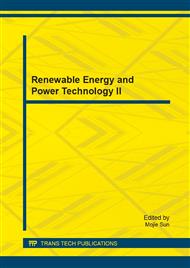p.2048
p.2052
p.2059
p.2065
p.2070
p.2077
p.2085
p.2098
p.2106
Assessment and Optimization of the Low Carbon Benefits of the Technical Transformation Projects for Loss Reduction in Power Networks
Abstract:
In the context of low-carbon economy, this paper analyzes the necessity of technical transformation of the loss reduction in power networks. A low-energy-consumption benefit evaluation model was established for some technical transformation projects for loss reduction, so was a low-emission benefit evaluation model for loss reduction measures. Through field survey and statistical computation, the CO2 emission reduction potential of a selected power supply company, by adopting technical transformation for loss reduction, was comprehensively assessed. On this basis, the optimization of low-carbon technical transformations for loss reduction in plan and construction, operation and maintenance, and management and administration was put forward, in order to realize the mentioned CO2 emission reduction potential of the company.
Info:
Periodical:
Pages:
2070-2076
Citation:
Online since:
October 2014
Authors:
Price:
Сopyright:
© 2014 Trans Tech Publications Ltd. All Rights Reserved
Share:
Citation:


